by Joe Domaleski | Sep 2, 2024 | Blog, Business, Columnists, Community, Front Page, News Center, Opinion, Top News
This past weekend, my wife, Mary Catherine, and I enjoyed a staycation up in Atlanta, high atop the 65th floor of the Westin Peachtree Plaza hotel. For some, Labor Day weekend means football. For others, it means time at the lake in front of a grill. For us, it means Dragon Con! I think every Atlantan needs to attend Dragon Con at least once, but for us, it’s a regular ritual. In fact, Dragon Con neatly coincides with our wedding anniversary in a few weeks. What better way to celebrate love than at Dragon Con, right ladies?

The view looking south from our Dragon Con hotel room on the 65th floor of the Westin Peachtree Plaza. Photo/Joe Domaleski
So what is it? Dragon Con is a large multi-genre convention held annually in Atlanta, Georgia, during Labor Day weekend and takes over most of the downtown Atlanta hotel district. It began in 1987, has grown to over 70,000 attendees, and has become one of the largest pop culture conventions in the United States. Dragon Con covers a wide range of genres, including science fiction, fantasy, gaming, comics, literature, art, music, and film. Events include costuming, panels, celebrities, art shows, live events, dealer halls, and the annual Saturday morning parade down Peachtree Street. We’ve been going since 2004, when our kids were little. Even though they’re all grown and out of the house, we still like to attend.
Attending Dragon Con is like going back home and being surrounded by a sea of fellow fans, cosplayers, and pop culture enthusiasts. As a member of Generation X, I grew up on Star Trek, Star Wars, and arcade games. All of that and more happens at Dragon Con. Events take place pretty much 24 hours a day during the five official days of the convention. As middle-aged attendees, we didn’t quite have the stamina to attend the all-night parties, but we still made the most of our time (and energy levels). There’s something really magical about being with so many people with diverse interests that share a common goal of having fun. It turns out, Dragon Con is more than just a weekend escape. Dragon Con is an example that play, creativity, and having a good time are just as important now as they were when we were kids. Let’s explore the importance of all that from a middle-aged geek’s perspective.
Rediscovering the Fun in Play
One of the first things that impresses me at Dragon Con is the sheer joy of it all. Everywhere you look, there are people having fun and playing. From the elaborate costumes to the random dance-offs in the hotel lobbies, everyone is having a great time. For those of us juggling work, family, and life’s never-ending to-do list, play often feels like something we simply don’t have time to enjoy. But being at Dragon Con reminds me that play isn’t just for kids. Fun and play are necessary parts of life, no matter how many candles were on your last birthday cake.
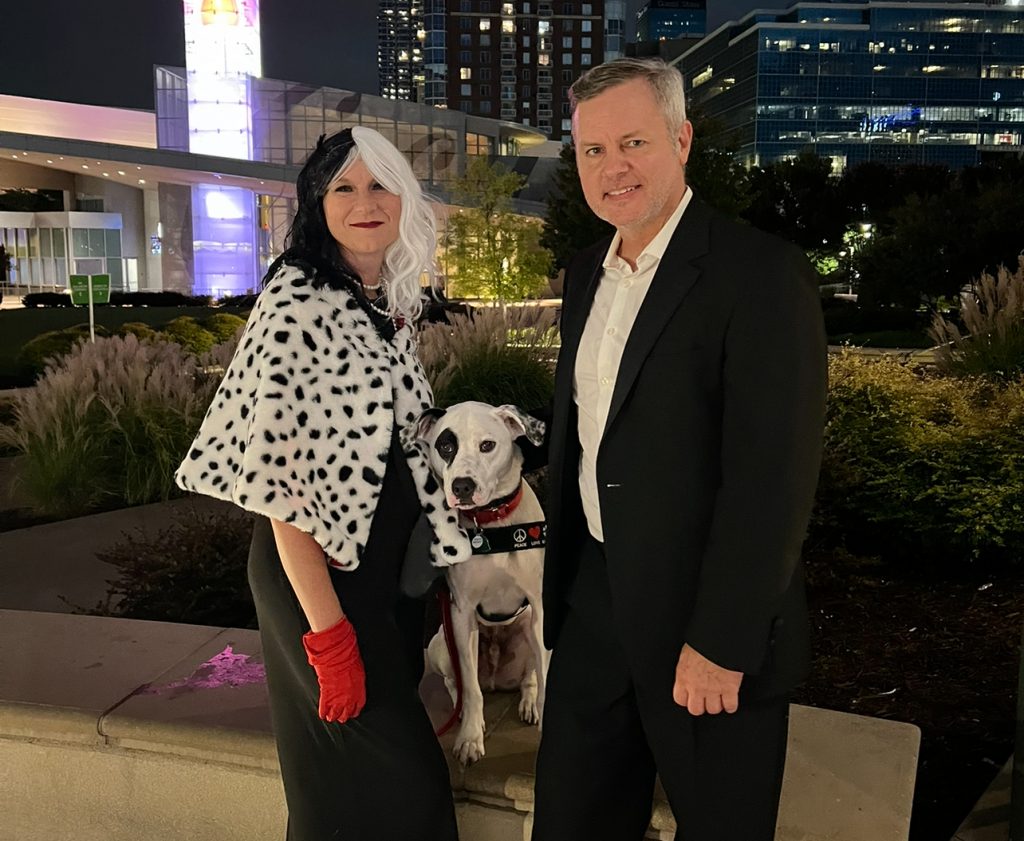
My wife Mary Catherine as Cruella de Vil with our dog Loki and me in front of the Georgia Aquarium at Dragon Con 2024. Photo/Joe Domaleski
At Dragon Con, play is the name of the game. Whether you’re dressing up as your favorite character or just people-watching, you’re encouraged to let loose and have fun. And this kind of play isn’t just about blowing off steam; it’s about recharging your batteries and reconnecting with that part of yourself that still knows how to be carefree. Trust me, that’s something we all need more of—including me.
Creativity: It Doesn’t Get Old
Another thing Dragon Con reminds me of is that creativity doesn’t have an expiration date. Walking around, I was blown away by the sheer talent on display—from the meticulously crafted costumes to the original artwork and fan fiction. It’s proof that creativity doesn’t fade with age; if anything, it gets richer.
As we get older, our creative outlets might change, but that doesn’t mean we stop being creative. Whether you’re writing, building, designing, or just appreciating the work of others, Dragon Con shows us that there’s no age limit on imagination. Engaging in creative activities—especially in a place as inspiring as Dragon Con—can reignite passions we may have put on the back burner and remind us that it’s never too late to create something new.
Finding Your Tribe
One of the things I love most about Dragon Con is the sense of community. People from all walks of life come together, united by their shared love for a particular show, book, or game. It’s a very tangible reminder that no matter how different we may seem, there’s always something that can bring us together.

Celebrating our 30th Wedding Anniversary during Dragon Con with a dinner at the iconic Polaris Restaurant and Lounge high atop the Hyatt Regency Atlanta. Photo/Joe Domaleski
For those of us who’ve been around the block a few times, this sense of community can be a load of fun. Oftentimes, when I’m with groups of people in the local community, there’s a lot of networking going on—people are either asking me questions and trying to meet me for business purposes, or I’m doing the same thing. Don’t get me wrong, I love our community and enjoy networking, but sometimes it’s fun to be with people without a specific goal in mind. Events like Dragon Con show us that we’re part of something bigger—a network of people who get it, who share our interests and passions. Connecting with others who share our enthusiasm can be incredibly validating and up-lifting.
Learning New Things
Over the years, Dragon Con has become much more than just a gathering for science fiction and fantasy enthusiasts. The convention has expanded to offer a wide array of tracks that delve into science fact, providing attendees with opportunities to explore topics involving technology, robotics, astronomy, physics, and more. These tracks attract experts from various fields, including leading researchers, academics, and industry professionals, who share their knowledge and insights through panels, workshops, and discussions. Whether you’re a seasoned professional or just curious about these subjects, Dragon Con offers a unique platform to engage with complex scientific concepts in an accessible and often entertaining way. What’s really fun is that many of these experts are also fellow geeks and dress up in costumes. Often they’ll make points by using pop cultural references, which makes the learning fun.

Hampocalypse – amateur (ham) radio panel at Dragon Con 2024. I was the moderator (far right seated at the table) and Mary Catherine was also a panelist (second from the left). Photo/Jonathan Sarge
During this past weekend, I had the privilege of participating in a panel discussion on Artificial Intelligence with a group of PhD researchers and academics. The discussion was not only enlightening but also highlighted the real-world implications and ethical considerations of AI. The panel featured researchers who talked about AI in robotics, drug trials, physics, and even marketing data science (my favorite topic). On Saturday, I had the opportunity to moderate a panel on amateur (ham) radio, cleverly titled “Hampocalypse.” This session focused on the equipment and methods used to communicate in post-apocalyptic disaster scenarios—a topic that blends practical knowledge with a bit of speculative fun. The discussion covered everything from the basics of setting up a ham radio station to more advanced topics like emergency preparedness and survival communication strategies. These experiences at Dragon Con help foster learning and dialogue across a wide spectrum of interests that caters to both the imagination and the intellect.
Why Leaders Should Take Play Seriously
As someone who’s juggling a few different roles—family man, professional, teacher, student, community leader—I’ve thought a lot about the role of play in leadership. Dragon Con reinforced what I’ve long believed: that play isn’t just a break from the serious stuff; it’s an integral part of it. For leaders, engaging in playful activities can spark new ideas, boost creativity, and build stronger, more cohesive teams. Creative people need playtime regardless of their age.

Mary Catherine sitting along Peachtree Street at the Dragon Con parade with our dog Loki. He’s wearing his Demogorgon Dog costume from the TV show Stranger Things. Photo/Joe Domaleski
Taking time to play, whether at an event like Dragon Con or in smaller, everyday ways, can make us better leaders. It opens our minds to new possibilities, reduces stress, and helps us approach challenges with a fresh perspective. It’s also a chance to pursue interests with no specific goal or aim other than to have fun. Within reason, it’s also a chance to enjoy things and not care what anybody else thinks. As we grow older, it’s easy to fall into the trap of thinking that play is for kids, but that couldn’t be further from the truth. Play is for everyone, and it’s especially important for those of us who tend to take life too seriously or think everything has to be in furtherance of a goal.
Conclusion: Embracing Your Inner Geek
Seeing everyone at Dragon Con reminded me that we all have a bit of geek in us, no matter our age or interests. Embracing that geek, indulging in play, and nurturing our creativity is a vital part of living a balanced, fulfilling life. Whether you’re a lifelong fan or just dipping your toes into the world of fandom, Dragon Con offers a chance to step outside the everyday and into a world where imagination is celebrated.
Here’s to all the geeks out there, especially those of us who’ve been around the block a few times. We know that life becomes richer and more meaningful when we make time to play. Whether it’s attending conventions, crafting costumes, or just enjoying your favorite sci-fi show, it’s important to remember that fun isn’t just for kids—it’s for everyone. And now that Labor Day has passed, Halloween is right around the corner. Have you thought about what you’ll dress up as this year?
[Joe Domaleski, a Fayette County resident for 25+ years, is the owner of Country Fried Creative – an award-winning digital marketing agency located in Peachtree City. His company was the Fayette Chamber’s 2021 Small Business of the Year. Joe is a husband, father of three grown children, and proud Army veteran. He has an MBA from Georgia State University and enjoys sharing his perspectives drawing from thirty years of business leadership experience. Joe is a recipient of the Peachtree City Rotary Club Business Leader of the Year Award for 2024. Sign up for the Country Fried Creative newsletter to get marketing and business articles directly in your inbox. You can connect with Joe directly on LinkedIn or follow his new blog Marketing Data Science for more insights and updates.]
by Joe Domaleski | Aug 26, 2024 | Blog, Business, Columnists, Community, Front Page, News Center, Opinion, Top News
Thank you readers. Believe it or not, this is my 100th column for this newspaper! Over the past two years, I’ve really enjoyed sharing personal insights, stories, business tips, and even the occasional ramble with you. A lot of work goes into each article—more than I suspected when I first started. But as I look back over the experience, I can honestly say it’s been worth it. Writing has helped me learn more about myself and the topics I’ve covered. It’s one thing to think about things; it’s another to articulate those thoughts in writing.
When Cal Beverly encouraged me to start this column in the late summer of 2022, I was a little apprehensive. Do you remember my first column about why I started a local business? A full slate of seasoned columnists were already writing, and I wasn’t sure what I would write about or how I would fit in. They had a loyal following, and it wasn’t clear what I could offer. Frankly, I kinda decided what I didn’t want to write more than I knew what I wanted to talk about. I think it’s clear by now that I have avoided making commentary about local or national politics. It’s not that I don’t care (I do), but politics isn’t my jam.
While I believe in free speech, it hasn’t been easy being associated with others who exercise that right so vigorously. I’ve been criticized by people on both the left and the right who’ve asked me to take a stand on various issues. Most of the criticism has been minor and hasn’t appeared in this paper. Again, politics is not my thing, so I’ve just tried to avoid such topics. Regardless of what you may personally believe, I will say that Cal Beverly has never once censored anything I’ve written or asked me to write for or against any particular topic. I’ve had free rein to write about what I wanted. Thank you for that, Cal.
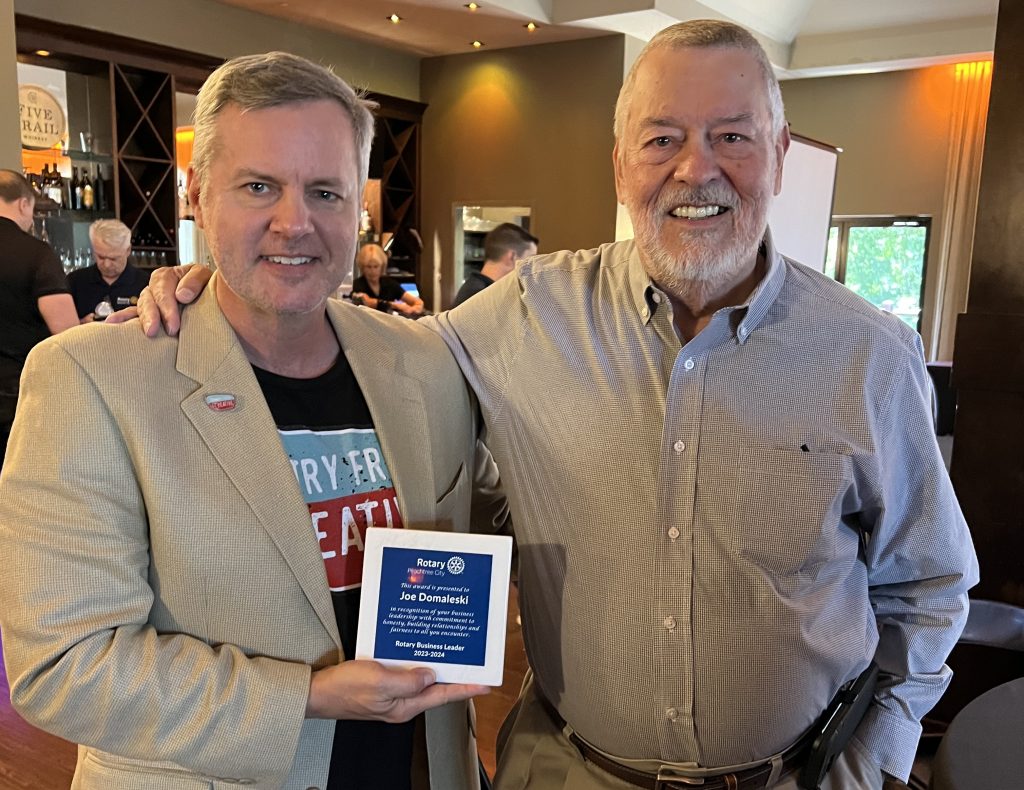
Joe Domaleski with Cal Beverly during a meeting of the Peachtree City Rotary Club. Photo/Ellie White-Stevens
Over the past few months, the view count from your readership has made this column one of the more popular features on the newspaper’s website. Although I don’t do it for the numbers (this is an unpaid gig for me), it is gratifying to know that some of you find value in it. What I really enjoy is when people see me in public and talk to me about some of the things I’ve written. Unlike some writers, I am pretty active in the local community and don’t hide behind a computer screen.
Today, I have some exciting news to share. Over the past year, my most popular columns have been about topics related to artificial intelligence (AI), analytics, marketing, and higher education. Indeed, I had no idea that my announcement about going back to school for another degree at Georgia Tech would be of interest to so many of you. Thank you for that support and encouragement. To delve deeper into those subjects and more, I’ve decided to start a new blog called Marketing Data Science with Joe Domaleski.
Several close friends encouraged me to start the new blog, and I just published my first post over the weekend. The blog will be hosted on the Medium.com platform. This new platform will allow me to explore the latest developments in data science and artificial intelligence, particularly how they apply to marketing and small business strategies. While these topics might seem complex, I aim to break them down into digestible insights that can help local businesses and nonprofits, just like yours, thrive in today’s digital age.
But don’t worry—I’m not going anywhere! As long as Cal will have me, I’ll continue writing here in the newspaper, bringing you the same blend of business insights and personal reflections you’ve come to expect. The new blog is simply an extension of my thoughts, providing a space to dive deeper into the fascinating world of data-inspired marketing. I also intend to chronicle my journey as a middle-aged graduate student on the new blog, which could prove to be very interesting.
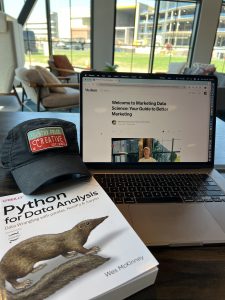
Previewing my new blog Marketing Data Science from our remote office at Trilith. Photo/Joe Domaleski
I hope you’ll follow me on the new blog and please tell friends and work colleagues about it. It’s a non-monetized blog, so I’m going to rely on old-fashioned word-of-mouth marketing, which is still very relevant despite algorithmic marketing techniques.
My new blog is located at: https://blog.marketingdatascience.ai.
Please keep reading this newspaper website as well. I’ll still be right here, sharing stories that I hope you’ll continue to enjoy reading. Thank you for being part of my journey as a writer and blogger. Here’s to the next 100 columns—and beyond!
[Joe Domaleski, a Fayette County resident for 25+ years, is the owner of Country Fried Creative – an award-winning digital marketing agency located in Peachtree City. His company was the Fayette Chamber’s 2021 Small Business of the Year. Joe is a husband, father of three grown children, and proud Army veteran. He has an MBA from Georgia State University and enjoys sharing his perspectives drawing from thirty years of business leadership experience. Joe is a recipient of the Peachtree City Rotary Club Business Leader of the Year Award for 2024. Sign up for the Country Fried Creative newsletter to get marketing and business articles directly in your inbox. You can connect with Joe directly on LinkedIn or follow his new blog Marketing Data Science for more insights and updates.]
by Joe Domaleski | Aug 19, 2024 | Blog, Business, Columnists, Community, Front Page, News Center, Opinion, Top News
Are you a dog lover? Most people are, and even if you’re not, most dogs love humans regardless of how you feel about them. The bond between humans and dogs is a special one, unlike anything else in the natural world. Dogs have an innate ability to understand and respond to our emotions, offering comfort in times of distress and sharing in our joy during moments of happiness. Not to take away from human relationships, but dogs exemplify unconditional love. This special bond was at the heart of our decision to welcome a new dog into our lives and train him as a therapy dog. Here’s the story of Loki, our new therapy dog.
Last spring, we were at McCurry Park on the east side of Fayetteville. I was spectating and cheering on the Fayette County Fire Department at the baseball portion of the Public Safety Games. My wife, Mary Catherine, was at the Fayette Parks & Recreation Dog Days of Summer event happening in the park at the same time. After watching Fayette County Fire beat Peachtree City in the finals, I climbed the hill up to the football practice area where the Dog Days event was taking place. Here’s a picture of what I saw.
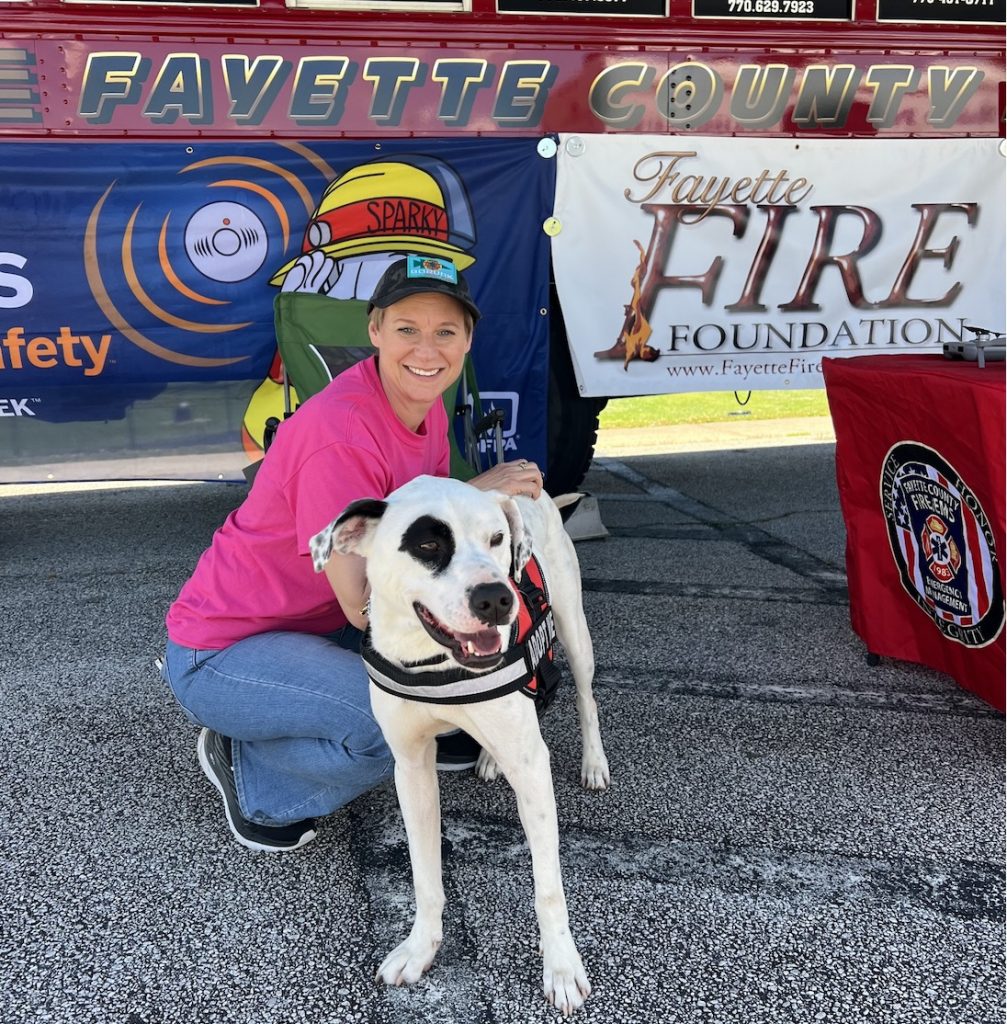
Mary Catherine Domaleski with Loki on his gotcha day last spring. It seemed appropriate to get his picture in front of the Fayette County fire safety bus. Photo/Joe Domaleski
Once I saw Mary Catherine with the dog, I somehow knew he was coming home with us (even though we weren’t really looking to adopt). We already have an older dog at home named Thor. He’s been a great dog, but he’s starting to slow down. Like me, he has a little arthritis. Maybe Thor needed a buddy? Originally named Lucky, we decided to rename the new dog Loki to complement our existing dog Thor. The names Lucky and Loki sound so similar that Loki (as we now called him) responded immediately to his rebranding.
As dog lovers, we both immediately fell in love with Loki, a spirited and affectionate rescue dog. We had to sign some papers with Bully Wag, the adoption agency, and have a trial period to make sure it was going to be a good fit for us, Thor, and Loki. Gone are the days when you can just pick up “pound puppies” and take them home. Most pet support organizations have a trial period so that there’s a long-term relationship, which cuts down on pet abandonment. After the trial period, more paperwork, and a trip to the vet, Loki became a permanent member of our family.
Loki has become an integral part of our lives, not just as a beloved pet but also as a loving therapy dog. With the expert guidance of a local dog trainer, we (mostly Mary Catherine) diligently trained Loki, and we couldn’t be prouder of the progress he’s made. I won’t go into details about the process, but it wasn’t easy. He had to pass a rigorous behavior test and several practicums in public places and at nursing homes. A local field examiner for the Alliance of Therapy Dogs (ATD) and the American Kennel Club (AKC) did a great job administering the tests and certifying Loki.
During this process, I learned about the difference between service dogs and therapy dogs. Here’s the difference:

Mary Catherine Domaleski holding the American Kennel Club certification ribbons earned by Loki the therapy dog. Photo/Joe Domaleski
Service Dogs are specially trained to assist individuals with disabilities. They perform specific tasks that help their owners manage their daily lives, such as guiding the visually impaired, alerting the deaf, or providing support for those with mobility issues. Service dogs have legal access to public spaces to support their owners.
Therapy Dogs, like Loki, are trained to provide comfort and emotional support to a wide range of people, often in settings such as hospitals, schools, and nursing homes. They do not have the same access rights as service dogs and are always accompanied by their handler during visits. Therapy dogs are primarily there to bring joy, reduce stress, and improve overall well-being.
So, we decided to go the therapy dog route for two main reasons. First, and most obvious, is that Loki has a very gentle and calm nature. From the moment we met Loki, it was clear that he had a natural disposition for providing comfort. His gentle demeanor, combined with his ability to stay calm in various situations, made him an ideal candidate for therapy work.
Secondly, it’s our desire to help others in the community. While a service dog typically serves the need of a single human, therapy dogs provide support for groups of people. We saw an opportunity to contribute positively to the lives of others, particularly those in need of emotional support. As I mentioned earlier, there’s something magical and uplifting about the bond between humans and dogs. We wanted to share the joy Loki brings to us with others, especially in settings like hospitals, schools, and nursing homes, where his presence could brighten someone’s day. He also brightens our day at home.
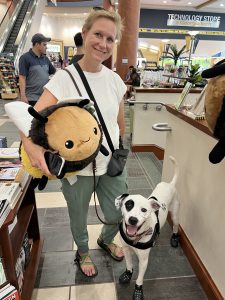
Mary Catherine and Loki inside the Georgia Tech bookstore last weekend welcoming students, including the author, back to school. The bookstore is dog friendly if you get permission. Photo/Joe Domaleski
We’ve been amazed at how well Loki has been received in the community, especially by children. People seem naturally drawn to his “eye patch.” Older folks, like us, see him and remember Petey the dog from The Little Rascals TV show. Younger folks think of the Target dog. Loki loves people. It’s our hope that Loki’s work as a therapy dog can help build stronger community ties. His visits with students, seniors, first responders, and people in the community can bring people together, fostering a spirit of care and togetherness.
Since Loki can’t be everywhere at once, we decided to share his love virtually through Instagram. Need a quick pick-me-up of good vibes? You can like, share, comment, and follow Loki’s Instagram account at:
https://instagram.com/lokitherapydog
So next time you see us out and about in the community, don’t be surprised if you hear us say, “Looky, it’s Loki!”—our new therapy dog. We hope you’ll stop and say “hello.” Loki looks forward to seeing you and brightening up your day.
[Joe Domaleski, a Fayette County resident for 25+ years, is the owner of Country Fried Creative – an award-winning digital marketing agency located in Peachtree City. His company was the Fayette Chamber’s 2021 Small Business of the Year. Joe is a husband, father of three grown children, and proud Army veteran. He has an MBA from Georgia State University and enjoys sharing his perspectives drawing from thirty years of business leadership experience. Joe is a recipient of the Peachtree City Rotary Club Business Leader of the Year Award for 2024. Sign up for the Country Fried Creative newsletter to get marketing and business articles directly in your inbox. You can connect with Joe directly on LinkedIn for more insights and updates.]
by Joe Domaleski | Aug 4, 2024 | Blog, Business, Columnists, Community, Front Page, News Center, Opinion, Top News
Just as I was preparing to finalize my column for the week, Governor Kemp declared a State of Emergency in advance of Tropical Storm Debby. I thought it might be a good idea to preempt my planned column to provide some thoughts about emergency preparedness. Just last week, a storm blew down some of our trees and took out our power for almost 24 hours, so this topic is still quite fresh on my mind.
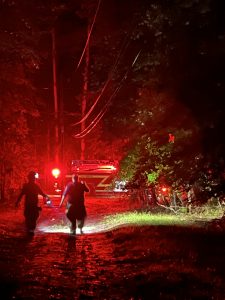
Fayette County Firefighters E. Moore & Frazier respond with Quint 2 at my house. We had power lines down on my car during the storm on the evening of July 30, 2024. Photo/Joe Domaleski
If you’ve read some of my previous columns, you know I place great importance on emergency preparedness. Some personal background is helpful so you know where I’m coming from. I volunteer with the Georgia Emergency Management and Homeland Security Agency (GEMA/HS) through their AuxComm program and wrote a column about how to apply the National Incident Management System (NIMS) to your business. If you’re in a leadership position at work, make sure you are prepared there. In this column, we’re going to focus on personal emergency preparedness.
After 9/11, I got really active in personal preparedness and attended the very first FEMA-sponsored Community Emergency Response Team (CERT) training hosted by the Peachtree City Police Department. That program is still going strong, and I highly recommend it.
My wife, Mary Catherine, shares my interest in preparedness, and we’re both licensed amateur (ham) radio operators. Earlier this year, I wrote a column about emergency communications and ham radio. Together, we’ve attended the Fayette County Citizen’s Fire Academy, the Fayetteville Police Citizen’s Police Academy, and the National Weather Service Skywarn spotter certification class. It’s important to know what our first responders do and how to be better citizens during incidents.
Well, the storm is coming this week, and you don’t have time to attend all of that training, so let’s focus on what you can do right now. Here are my suggestions:
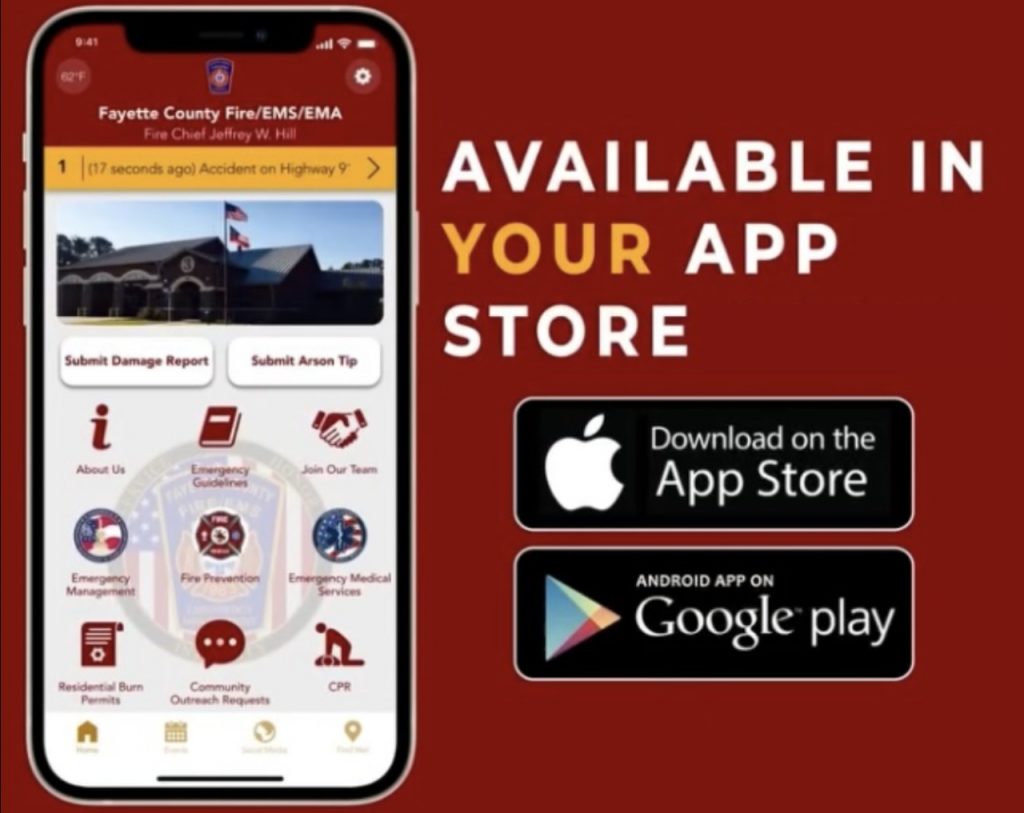
Fayette County Fire/EMS/EMA app now available for download. Photo/Fayette County Fire/EMS
- Stay Informed: The Fayette County Department of Fire and Emergency Services and the Fayette County Sheriff’s Office have new apps that will alert you to situations in our local area, including weather alerts, road closures, and other items of public interest. Download both of those apps from the Apple App Store or Google Play Store and turn on the messaging feature.
- Monitor the Weather: Although our public safety agencies relay official weather alerts, it’s also helpful to get those alerts directly from the National Weather Service. I recommend signing up for text alerts and having a Weather Alert Radio.
- Read/Listen/Watch the News: You’re obviously reading this column on a news website, but make sure you keep up with news from other sources. I’m a big fan of listening to broadcast radio, particularly WSB 750 AM/95.5 FM.
- Create an Emergency Plan: Know how you are going to escape your house, neighborhood, and local area if you need to evacuate. How are you going to communicate with family members if cell phones don’t work? Having backup communications is one reason my wife and I have amateur radio licenses. Have a backup communications plan. Also, consider other special needs like pets, infants, seniors, and individuals with disabilities.
- Build an Emergency Kit (aka “Go Bag” or “Bug out bag”): I keep a backpack ready to go in my car and another at home. It includes: water, water purification tablets, food, a first aid kit (I also carry a first aid kit in my laptop bag), tools & supplies, personal items, cash, documentation, hygiene products, battery chargers and cables, a change of clothes, inclement weather clothing, a flashlight, and a fire starter.
- Prepare Your Home: Ensure your home is ready by checking out the structure, fire escape routes, roofing, and possible areas of flooding. Know how to turn off utilities such as gas, water, and electricity if you need to do that yourself.
- Be Able to Protect Yourself and Your Family: I normally don’t make a big deal about it, but I do support the Second Amendment of the United States Constitution. Let’s just say that our family is prepared to exercise our Constitutional rights if that ever becomes necessary. I strongly encourage people, especially women, to take self-defense classes and have some type of personal defense system. There are some bad people out there, and sometimes an emergency brings out the worst in people.
- Just-in-Time Preparations: If I know a storm is coming, like I do right now, I will make sure all of my electronic devices are charged ahead of time and all of my radios, kits, and supplies are ready to be used if necessary.
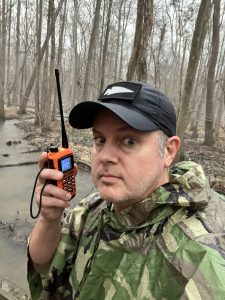
The author (FCC license: KI4ASK) using a waterproof, handheld VHF ham radio during inclement weather. Photo/Joe Domaleski
Preparation is the key to weathering a storm or any other emergency situation. Last week, when the power went out, we knew what to do immediately. Seeing that some lines were down on my car, I called the Fayette County non-emergency line at (770) 461-4357 (since no one was trapped or hurt), and Fayette County Fire came out to help assess the situation and clear the lines for me. NOTE: If it is truly an emergency or you’re not sure, then go ahead and dial 911. We were able to switch our internet connections to data hotspots so that we could keep watching the Olympics online that night. I used prepositioned flashlights to see around the house.
Because trees had fallen on our power lines, I knew it might take some time for the EMC to get to our house. The next morning, we got ready for work at our local gym, and I was able to work from my co-working office located at Roam at Trilith. Later that afternoon, I got a text message from my home HVAC system that the power had been restored. When I got home later that day, I saw that we had new power poles up in the yard. Thank you, Coweta-Fayette EMC. The whole situation could have been worse if we had not been prepared. We knew what to do, who to contact, and how to make alternate plans to keep things as normal as possible.
Stay safe this week by making plans now. What are some tips that you have for maintaining personal emergency preparedness?
[Joe Domaleski, a Fayette County resident for 25+ years, is the owner of Country Fried Creative – an award-winning digital marketing agency located in Peachtree City. His company was the Fayette Chamber’s 2021 Small Business of the Year. Joe is a husband, father of three grown children, and proud Army veteran. He has an MBA from Georgia State University and enjoys sharing his perspectives drawing from thirty years of business leadership experience. Joe is a recipient of the Peachtree City Rotary Club Business Leader of the Year Award for 2024. Sign up for the Country Fried Creative newsletter to get marketing and business articles directly in your inbox. You can connect with Joe directly on LinkedIn for more insights and updates.]
by Joe Domaleski | Jul 16, 2024 | Blog, Business, Columnists, Community, Front Page, News Center, Opinion, Top News
Over the years, I’ve come to understand that the success or failure of both business and personal endeavors most often depends on a single factor—our relationships with people. That’s not to say it is the only factor, but it does seem to have the most influence. No amount of money, automation, expertise, or sheer willpower can fix a broken relationship. Broken relationships can derail projects, lose customers, run off good employees, start wars, end marriages, and cause all sorts of problems.
When it comes to relationships, things often fall along a spectrum between negative sentiments like blame and good feelings like praise. Whether we are assigning blame for a project’s failure or giving praise for a job well done, these actions shape our relationships and can significantly impact the success of our business and personal lives. NOTE: I am not a psychologist, so this article is just my personal opinion and should not be construed as professional medical advice.
If you’ve read some of my previous articles, you know that I have a background in math and science. We regularly apply data science principles to the work we do at my marketing agency. Most of our staff do creative work, and they excel at that. Since their work is done in a business context, that creativity is applied to helping clients reach their marketing goals. In order to be effective, we apply data science and analytics to measure, assess, and even predict marketing results.
You can have the most creative marketing campaign in the world, but if no one sees it, then that campaign is not likely to succeed. What if we apply some of those same principles to relationships? Both marketing and relationships deal with people. All too often, good intentions, like great creativity, don’t necessarily translate to better results or better relationships. So indulge me a moment while I assume the role of a data scientist to explore some characteristics of business and personal relationships.
Like any good scientist, I’m going to start by defining some key terms. These terms could apply to people or non-corporeal entities, but we’re going to focus on people:
• Relationship: The way in which two or more people are connected, interact, and affect each other.
• Blame: The act of holding someone responsible for a fault or wrong.
• Praise: The act of expressing approval or admiration for someone’s actions or achievements.
• Attribution: The process of determining the cause or reason behind an outcome or event.
• Agents: The individuals or entities involved in actions or events, often the subjects of attribution.
In both business and personal contexts, the way we assign blame and praise plays a crucial role in shaping our relationships and interactions. All too often, people fall victim to personal biases, stereotypes, and even media influences to falsely blame or praise others. Misattributions like that are normally done as an emotional response with very little thinking involved. By understanding these dynamics with an open heart and open mind, we can foster healthier and more productive connections. Now, let’s delve deeper into the key characteristics of relationships using data science to better understand other people:
Key Characteristics of Relationships from a Data Science Perspective
Direction: Simply put, a relationship tends to either be a positive one or a negative one often fluctuating between the two directions.
• Positive Relationship: When we give praise, we often see positive outcomes such as increased motivation and improved performance. For example, acknowledging an employee’s hard work can boost their morale and productivity. Of course, falsely giving praise can backfire and be misinterpreted as insincerity.
• Negative Relationship (Inverse): Assigning blame can lead to negative outcomes such as decreased trust and lower morale. For instance, blaming a team member for a project’s failure can result in resentment and reduced collaboration. Yet, there are times when a failure needs to be acknowledged so that improvement can occur.
Magnitude (Strength): The impact of blame and praise can vary in intensity. Strong attribution of praise can lead to significant improvements in relationships and performance, while strong attribution of blame can cause severe damage to trust and cooperation.
Form: Imagine for a moment that we were graphing a relationship on a standard cartesian plane (aka “x/y graph”).
• Linear Relationship: Consistent recognition of effort (praise) can steadily improve performance over time. Such a graph would should a consistent rate of improvement.
• Non-linear Relationship: Blame may have a more complex relationship, where occasional blame might not have a significant impact, but repeated blame can exponentially harm relationships and performance.
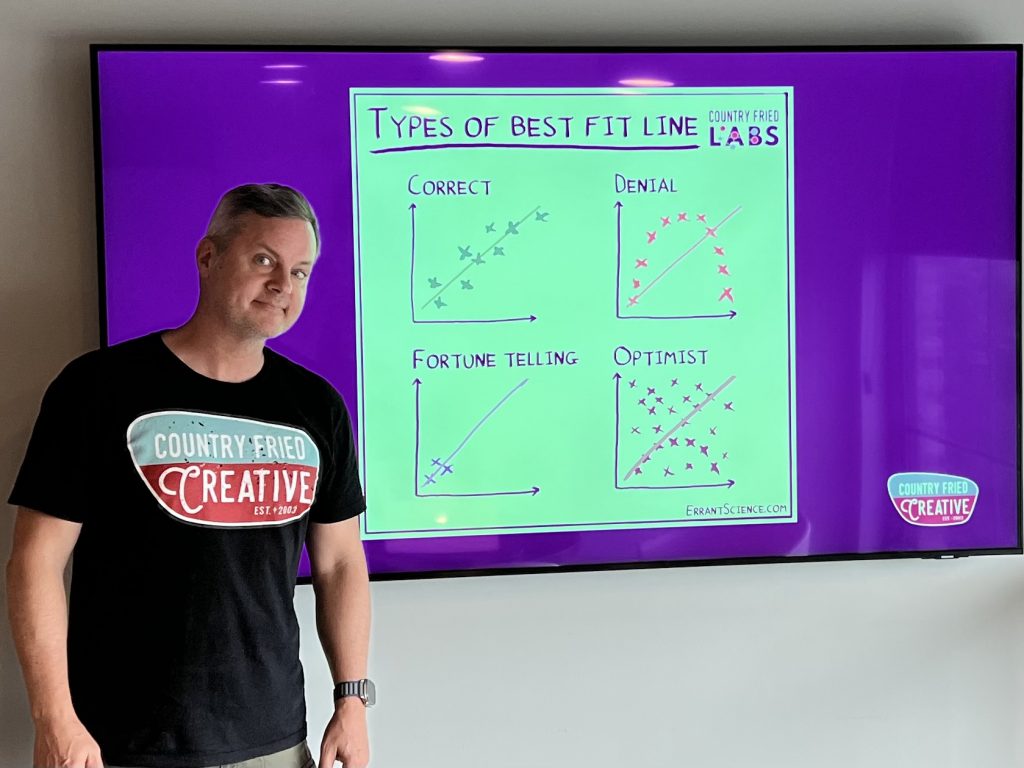
The author explaining some humorous examples of best fit lines on an x/y graph. Photo/Sophie Castellon
Causality: Directly attributing success to an individual’s actions (praise) can encourage continued positive behavior. Conversely, directly attributing failure to someone’s actions (blame) can discourage and demotivate them.
Association: Understanding the context and factors associated with outcomes can help in fair attribution. For instance, recognizing external factors that contributed to a project’s failure can prevent unfair blame and foster a more supportive environment.
Direction of Influence:
• Unidirectional Relationship: Sometimes, praise or blame might flow in one direction, such as from a manager to an employee. In general, this isn’t a good model for long-term success in a relationship.
• Bidirectional Relationship: In healthy relationships, both business and personal, there’s often a two-way street of giving and receiving praise and blame, which helps in maintaining balance and mutual respect.
Consistency: Fair and consistent attribution of praise and blame builds trust and reliability in relationships. Inconsistent attribution, on the other hand, can lead to confusion and distrust. This can be hard to do, and some people have long memories and “keep score.” It’s been my experience that consistency is one of the most important relationship characteristics. Blaming other people has never been one of my strong suits, although some people excel at blaming others for everything.
Temporal Precedence: I really just wanted to use that word – temporal, which simply means something is related to time. Ensuring that attributions of blame or praise are timely can make them more meaningful and effective. Immediate recognition or constructive feedback tends to have a greater impact. In other words, try to acknowledge the situation as quickly as possible and don’t save it up for later.
Leadership and the Role of Blame and Praise
Leadership plays a critical role in how blame and praise are managed within a business. Effective leaders understand the importance of taking responsibility for failures and assigning praise to others for successes. This approach not only builds trust but also fosters a positive and productive work environment. Unfortunately, many leaders have forgotten how to do this. Here’s three things to consider in that regard.
1. Leaders and Blame: Good leaders are quick to take blame when things go wrong. This shows accountability and protects the team from undue criticism. It also encourages a culture of learning from mistakes rather than fear of retribution. By taking blame, leaders can redirect the focus towards finding solutions and improving processes, rather than getting bogged down in fault-finding.
2. Leaders and Praise: Effective leaders generously ascribe praise to their team members. Recognizing and celebrating individual and team achievements boosts morale and motivation. This does not mean “everyone is a winner”. Quite often, there is a single winner in a contest or competition. Assigning praise where it’s due reinforces positive behaviors and encourages a culture of appreciation and recognition.
3. Avoiding Toxicity: Leaders must be vigilant against toxic behaviors, such as individuals who constantly blame others or look for causation where none exists. These behaviors can undermine trust and collaboration within the team. Addressing and mitigating toxic behaviors promptly helps maintain a healthy and supportive work environment. This is one of my biggest pet peeves in dealing with people – the Schleprocks and Eyeores of the world who are always negative about everything.
Relating This Back to Relationships
In business, understanding how we assign blame and praise can transform team dynamics and performance. By giving praise where it’s due and fairly attributing blame, we foster a culture of accountability and appreciation. This not only enhances individual motivation but also strengthens team cohesion. In my company, we try to do that with regular team recognitions. On a daily basis, this happens in our company group chat. On a monthly basis, this happens at our all-hands team meeting.
In our personal lives, the principles are similar. Recognizing and appreciating the efforts of our loved ones while being mindful of how we assign blame can improve our relationships. Constructive feedback, combined with genuine appreciation, can build a foundation of trust and mutual respect. In many ways, this is harder to manage at home than it is in the workplace. In a previous article, we examined the five love languages, and you might find some good tips about how to enhance relationships in that article.
Final Thoughts
Ultimately, the way we manage blame and praise in our relationships will have a direct impact on the probability of success or failure in your endeavors. By focusing on fair attribution and recognizing the positive contributions of others, we can create an environment where everyone feels valued and motivated. This approach not only drives success in business but also nurtures healthier, happier personal relationships. The key is to balance blame and praise thoughtfully, fostering a culture of growth, appreciation, and mutual support.
I would encourage you to take a closer look at how you assign blame and praise in your daily interactions. Using key concepts from data science that we explored earlier in this article can help provide a framework for managing your relationships. Reflect on your personal and professional relationships, and consider how fair attribution can make a difference. Start by giving genuine praise where it’s due and taking responsibility when things go wrong. Encourage a culture of constructive feedback and appreciation, both at work and at home. By doing so, you can contribute to building stronger, more positive relationships that benefit everyone involved.
[Joe Domaleski, a Fayette County resident for 25+ years, is the owner of Country Fried Creative – an award-winning digital marketing agency located in Peachtree City. His company was the Fayette Chamber’s 2021 Small Business of the Year. Joe is a husband, father of three grown children, and proud Army veteran. He has an MBA from Georgia State University and enjoys sharing his perspectives drawing from thirty years of business leadership experience. Joe is a recipient of the Peachtree City Rotary Club Business Leader of the Year Award for 2024. Sign up for the Country Fried Creative newsletter to get marketing and business articles directly in your inbox. You can connect with Joe directly on LinkedIn for more insights and updates.]
by Joe Domaleski | Jul 2, 2024 | Blog, Business, Columnists, Community, Front Page, News Center, Opinion, Top News
Some of my friends and family have encouraged me to put down some of my nonfiction books and consider reading more fiction books as a way to relax and explore new perspectives. Recently, I finished reading Ministry of Time by Kaliane Bradley. It was just released in May 2024 and is attracting a lot of positive attention. The book puts a new twist on time travel by bringing historical figures to the present day through a time door. It’s a fun book that has a little of everything in it as the historical characters try to adjust to modern times. Reading the book got me wondering what our Founding Fathers would think of our country and society today if they were transported to modern times.

Mary Catherine and Joe Domaleski at the 2024 Camp Southern Ground Ruck & BBQ event. Photo/Joe Domaleski
Obviously, we can’t transport the founders of our country in time, but we can engage in a thought experiment. With Independence Day coming up on July 4th, I thought about the Declaration of Independence – that beautifully written and uniquely American document which gave official birth to our nation. Let’s explore the key parts of the Declaration of Independence and their relevance today by considering the spirit of 1776 in 2024. Every attempt will be made to refrain from commenting on the sorry state of national political affairs. We’re going to focus on the Declaration document itself and its application to modern living in 2024.
A Bold Declaration
There’s nothing quite like it. The Declaration of Independence is a bold and audacious document. In 1776, the American colonies were challenging the most powerful empire in the world – the British Empire. The Declaration begins with a clear statement of intent: the colonies are dissolving their political ties with Britain to assume an equal standing among the other nations of the world. This bold declaration wasn’t wishy-washy. It wasn’t merely an act of rebellion but a direct statement about a people’s right to self-determination. Today, this spirit of boldness is seen in various movements advocating for social, political, and environmental change. The courage to stand up for what is right is an American legacy that continues to this very day. I do think our Founding Fathers would be proud of our willingness to stand up for just causes, but they would probably not understand “ghosting” and people who shy away from directness and candor. This applies to our business and personal lives as well. Just as the Declaration articulated a clear direction and purpose for the future, business leaders can benefit from having a well-defined vision and mission. This clarity can drive motivation, align efforts, and inspire innovation.
My Spirit of 1776 takeaway from this is to be bold.
Unalienable Rights
The Declaration famously asserts that all men (people) are created equal and are endowed with certain unalienable rights, among these are life, liberty, and the pursuit of happiness. These words have echoed through the centuries, forming a core feature of distinctively American values. In 2024, the fight to protect these rights is as vigorous as ever. Debates over healthcare, education, and equality continue to this day. These unalienable rights serve as a guiding principle for policymakers and citizens striving to create a more just society. In our work life, this means creating an environment where employees and customers feel valued, respected, and free to express themselves. Leaders should see to it that workplace policies and practices promote work-life balance, mental health, and career satisfaction. Doing so can lead to a more engaged and productive workforce.
My Spirit of 1776 takeaway from this is to strive for equality and recognize that everyone has a basic set of rights.
Efforts to Resolve Issues
Before declaring independence, the colonies made numerous attempts to resolve their grievances with the Crown. They sought a peaceful resolution through petitions and appeals to British authorities, which were met with indifference or outright hostility. This aspect of the Declaration highlights the colonies’ preference for peaceful reconciliation before resorting to violence. Yes, we eventually had to resort to armed conflict as a nation, but we didn’t start off that way. Today, this legacy encourages us to pursue diplomatic and nonviolent solutions to conflicts and domestic disagreements. Unfortunately, many in society seem to have forgotten this concept of nonviolence. In modern times, Dr. Martin Luther King, Jr. espoused a similar nonviolent approach. Seeking resolution without violence is appropriate for the marketplace as well. Collaborative problem-solving and mediation can help maintain a harmonious work environment. Encouraging open communication and fostering a culture where grievances can be addressed without fear of retaliation are essential for organizational health.
My Spirit of 1776 takeaway from this is to seek peaceful resolution of disagreements when possible without resorting to extreme actions.
Stating the Issues
The Declaration meticulously outlines the colonies’ grievances against King George III, providing a detailed account of the injustices they endured. This clarity and specificity helped to galvanize support for the independence movement. In our current era, the importance of clearly articulating issues remains critical. A “rebel without a cause” is not likely to succeed. From political campaigns to social justice movements, the ability to clearly communicate grievances and demands is essential for mobilizing support and effecting change. I’m reminded of the failed “Occupy Wall Street” movement from several years ago that fizzled out because there wasn’t a clear statement of issues or purpose. Transparency and accountability in addressing problems are as vital now as they were in 1776. This works for businesses too. Clearly stating challenges and goals is crucial in any professional setting. Whether it’s presenting a business case, proposing a new project, or addressing team issues, being able to communicate clearly and persuasively is vital. This clarity helps ensure that everyone is on the same page and can work together effectively to achieve common objectives.
My Spirit of 1776 takeaway from this is to be clear and specific when working towards a common purpose.
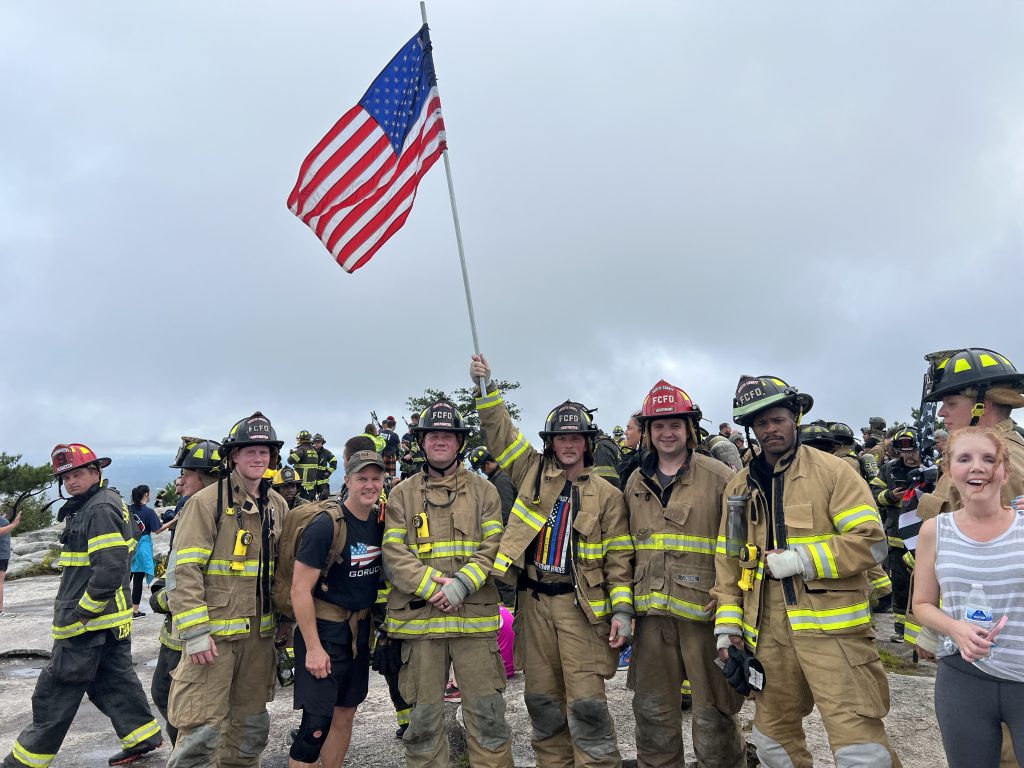
Proud to be an American. Me (second from left) with my son-in-law Connor McKinlay (third from left) and members of the Fayette County Fire Department atop Stone Mountain for a 9/11 Memorial Event. Photo/Joe Domaleski
The Result of These Issues
The Declaration culminates in the assertion that the colonies have the right to be free and independent states, absolved from all allegiance to the British Crown. This decisive action was the result of the unresolved issues and grievances that had reached a breaking point. The successful struggle for independence set the stage for the creation of a new nation founded on democratic principles and individual liberties. Decisive action is important in professional growth and organizational success. This might involve making strategic decisions, taking calculated risks, or implementing changes to improve processes and outcomes. Being decisive can help professionals seize opportunities, overcome challenges, and drive progress. In 2024, we continue to build on this foundation, by addressing ongoing challenges and upholding the values of freedom and justice at work and within society as a whole. The willingness to take decisive action when necessary remains a hallmark of the American Way.
My Spirit of 1776 takeaway from this is to be a decisive leader.
Conclusion
As I reflect on the spirit of 1776 in 2024, it’s clear that the principles enshrined in the Declaration of Independence are as relevant today as they were over two centuries ago. The boldness of our Founding Fathers, their commitment to unalienable rights, their efforts to resolve issues peacefully, their clarity in articulating grievances, and their decisive action continue to inspire me. By applying these principles to our personal and professional lives, I believe we honor their legacy and continue to build a nation rooted in the pursuit of life, liberty, and happiness. So, as we celebrate Independence Day, let’s remember the Spirit of 1776 and how it applies in 2024. How can we do that?
- Be bold
- Strive for equality
- Recognize peoples’ rights
- Be clear and specific
- Seek peace when possible
- Be decisive
Happy birthday America. I don’t always understand you, but I do love you very much.
[Joe Domaleski, a Fayette County resident for 25+ years, is the owner of Country Fried Creative – an award-winning digital marketing agency located in Peachtree City. His company was the Fayette Chamber’s 2021 Small Business of the Year. Joe is a husband, father of three grown children, and proud Army veteran. He has an MBA from Georgia State University and enjoys sharing his perspectives drawing from thirty years of business leadership experience. Joe is a recipient of the Peachtree City Rotary Club Business Leader of the Year Award for 2024. Sign up for the Country Fried Creative newsletter to get marketing and business articles directly in your inbox. You can connect with Joe directly on LinkedIn for more insights and updates.]
















